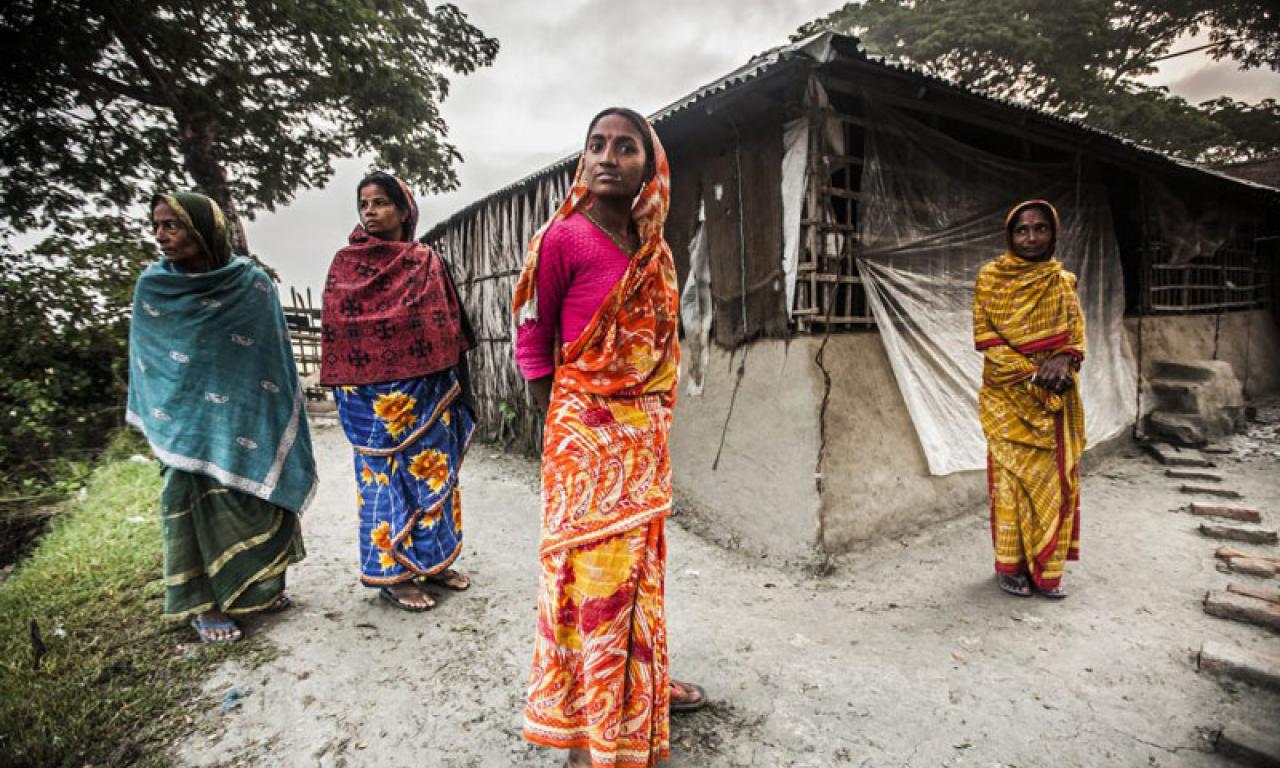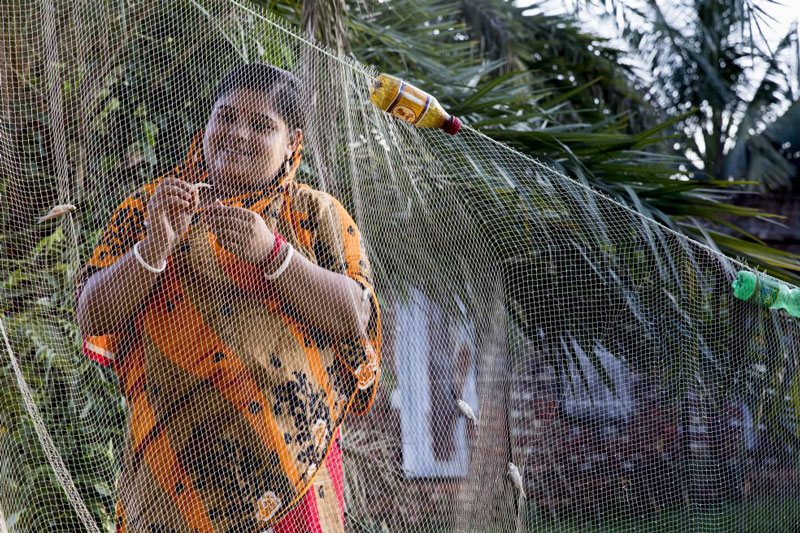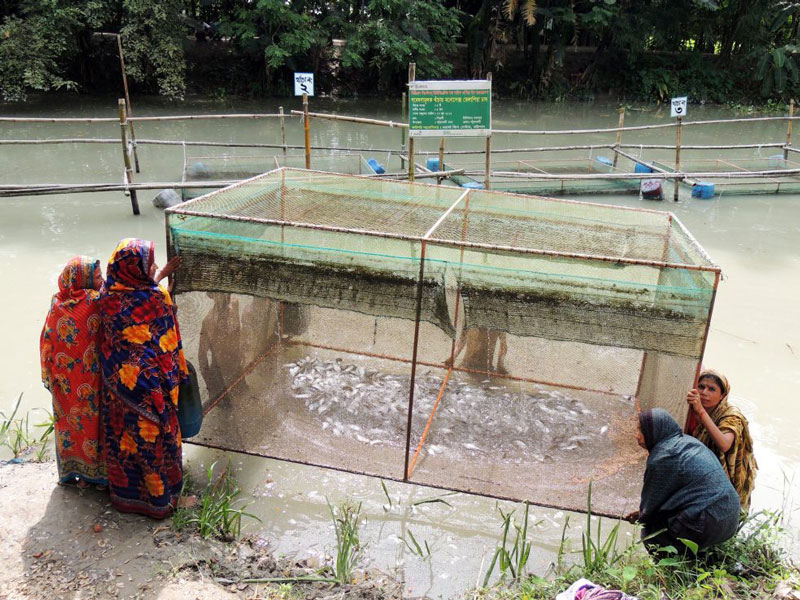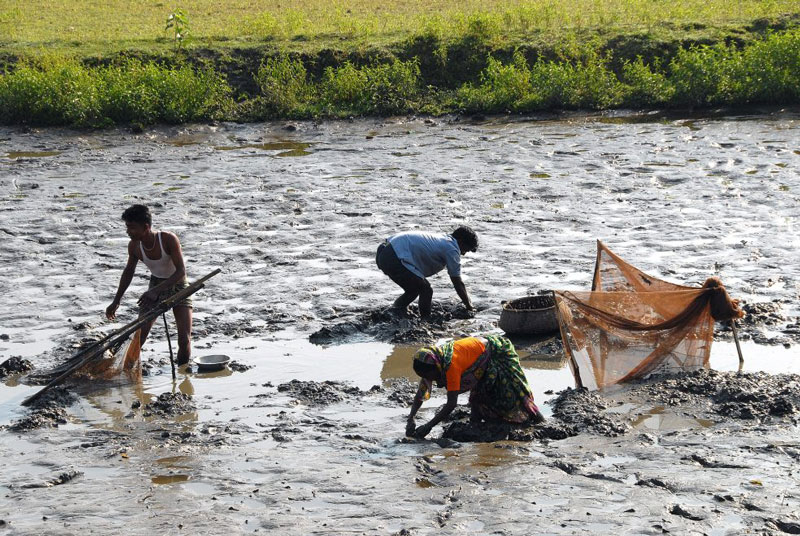
Through disruption to aquatic food value chains, the COVID-19 pandemic has jeopardized the livelihoods of small-scale fish farmers in Bangladesh. Many of the nation’s rural inland and coastal communities depend on the aquatic food systems for income-generation and good nutrition. However, travel restrictions and limited markets have slowed aquatic food production and threatened actors along fish value chains, posing particular challenges for fisherwomen faced with gender-related employment barriers.
Through disruption to aquatic food value chains, the COVID-19 pandemic has jeopardized the livelihoods of small-scale fish farmers in Bangladesh. Many of the nation’s rural inland and coastal communities depend on the aquatic food systems for income-generation and good nutrition. However, travel restrictions and limited markets have slowed aquatic food production and threatened actors along fish value chains, posing particular challenges for fisherwomen faced with gender-related employment barriers.
Bangladesh is one of the world’s leading inland aquatic food producers, and both women and men actively participate in the aquaculture sector. Nonetheless, rural women often face cultural, religious and physical barriers to performing hands-on work as fish harvesters. Obstacles to women’s work make families more susceptible to financial losses, if the male provider of the household becomes unemployed or unable to work.
Countering barriers to women’s participation

To further women’s involvement in aquaculture, WorldFish researchers in Bangladesh were instrumental in forming a Women Business Center in partnership with the Women Business in Gillnet Project. The center is a resource hub for women to access information, training, and business opportunities. Through the dissemination of low-cost gill-net technology, the project aims to make fish harvesting more accessible to women and increase household consumption of nutritious fish species.
Gill nets enable women to enter homestead ponds and harvest fish without getting their sarees wet—which need to be washed and hung out to dry and remain a major deterrent to women’s participation. With gill nets, women can stand on the pond bank to collect enough fish for family meals; before, they were reliant on their husbands to harvest fish or employed local men in their absence, a costly endeavor. Reducing barriers for fisherwomen can also increase children’s consumption of nutrient-rich small fish, which is critical in a nation where 36 percent of children under five suffer from malnutrition.
With the aid of the Women Business Center, women were also able to make informed choices to buffer themselves against market disruptions from COVID-19. Women received training on market linkages, alternative business plans, and coping strategies, along with health precautions to protect themselves and their families. The training added a new dimension to the role of women in aquaculture and provided them the skills and confidence to manage family finances.
Shamoly, a 22 year-old fish farmer the rural village of Amtola, was one such success. Staff at the Women Business Center advised her on inputs and cultivation practices, allowing her to profit nearly 70,000 BDT, or 800 USD, from homestead fish production.
“I’m now economically independent and able to meet my family’s financial obligations. I’ve gained confidence as a woman that I can do it,” said Shamoly.
Through working with the Women Business Center fish farmer Ety from Gongarampur village learned how to reorganize her business to compensate for COVID-19 losses. As part of her alternative business plan, she adopted a polyculture approach—cultivating pangas, a type of larger freshwater fish native to Asia, alongside traditional small white fish. Later, she applied her new knowledge on linking markets through dealers to sell her products for BDT 30,000, or 353 USD, in profit.
When recalling the early challenges of the COVID-19 pandemic, Ety said, “In those times, quality feed was not available in the market, and I worried about low fish production. But now I know how to cope and survive.”
Valuing women in aquaculture

Women account for 30 percent of the aquaculture workforce in Bangladesh but are largely limited to gender-based roles, like cleaning ponds and fish processing. They are often excluded from physical fishing activities and management institutions because fishing has long been relegated to men. However, researchers found the perception of women in aquaculture is changing gradually as women acquire more diverse positions and contribute financially to the household.
In the gender perspectives survey, WorldFish researchers found women are increasingly involved in multiple facets of aquaculture activities, including pond stocking, fish feeding, pond management, fertilization, fish harvesting and marketing. In a random sample of 240 different aquaculture sector actors, 51 of respondents were small-scale women farmers. The survey found that women are diverse, critical actors in Bangladesh’s farmed fish production—they make and mend fishing nets, feed and catch fish from ponds, manage, process, cook and sell fish.
About 1.4 million women contribute to the nation’s aquatic foods sector, yet their informal contributions are largely undervalued and underreported. WorldFish research aims to highlight the unsung heroes of fisheries and aquaculture with continued investment and capacity building interventions.
Working together for an equal future

To strengthen household resilience, gender-transformative approaches—which engage women and men together in understanding and co-creating locally developed strategies to shift underlying gender barriers that perpetuate inequalities—can be used to build the capacity of women along aquaculture value chains. Gender transformative approaches go beyond narrowly focused intervention programs and instead address systemic issues, creating opportunities for individuals to challenge gender norms and address power inequities. They provide an opportunity to improve women’s participation in traditionally male–dominated aquaculture activities like pond stocking and fish transport.
In support of small-scale fisherwomen, WorldFish researchers in Bangladesh conducted a ‘Gender Perspective Survey on COVID-19’ as part of the USAID-funded Feed the Future Bangladesh Aquaculture and Nutrition Activity, which aims to achieve inclusive aquaculture growth. By amplifying diverse gendered perspectives, researchers can target the unique challenges faced by women in developing resilient livelihoods amidst economic upheaval.
Supported by the Women Business Center, the small-scale fisherwomen of Bangladesh are optimistic about their ability to operate independently after the project support phases out. The fisherwomen are now prepared to face gender-based and societal obstacles head-on. By tackling financial insecurity and gender-based discrimination, they have demonstrated both their resilience and value to fisheries production.
“We want to prove that we can do it,” said fish farmer Ety. “That there is no job that can only be done by a man.”
